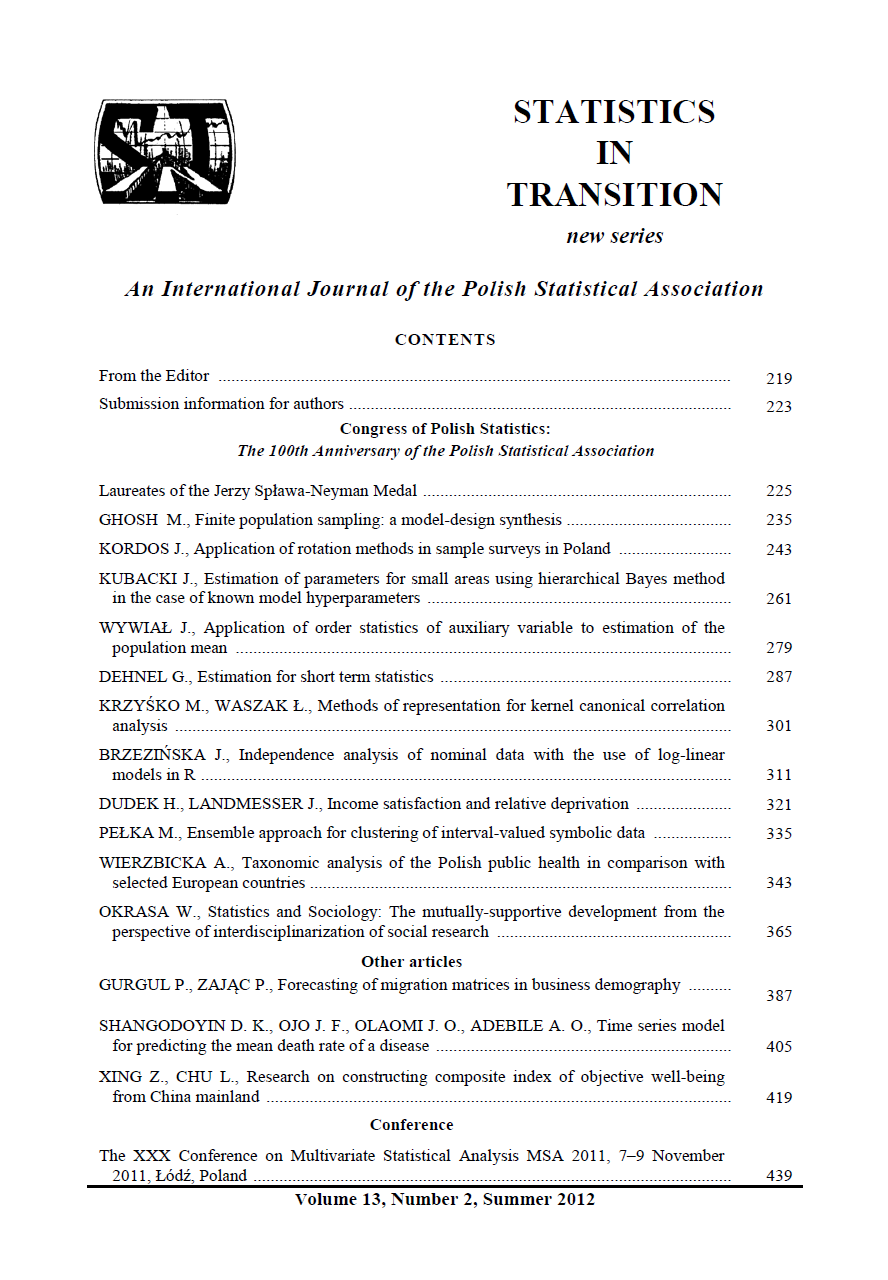ARTICLE
ABSTRACT
The main objective of the study is to identify determinants of income satisfaction in Poland. For this purpose, income situation of households in relative terms is analyzed. The effects of the relative deprivation on income satisfaction in various socio-demographic groups of households are also examined. The method of partially generalized ordered logit models is used in the paper. The empirical investigation is based on data from Household Budget Survey carried out by the Polish Central Statistical Office in 2009
KEYWORDS
Income Satisfaction, Relative Deprivation, Partially Generalized Ordered Logit Model.
REFERENCES
BRANT, R. (1990). Assessing proportionality in the proportional odds model for ordinal logistic regression, Biometrics, 46(4), 1171-1178.
D’AMBROSIO, C. and FRICK J. (2007). Income satisfaction and relative deprivation: An empirical link, Social Indicators Research, 81(3), 497–519.
DUDEK, H. (2007). An identification of farmers’ households in danger of poverty on the ground of ordered logit model, [in:] K. Jajuga i M. Walesiak (eds.): Klasyfikacja i analiza danych – teoria i zastosowania, Taksonomia 14, Wydawnictwo AE we Wrocławiu, 367-375.
DUDEK, H. (2009). Subjective aspects of economic poverty – ordered response model approach, [in:] W. Ostasiewicz (ed.), Quality of Life Improvement through Social Cohesion, Research Papers of Wrocław University of Economics, 73, 9-24.
DUDEK, H. (2011). Skale ekwiwalentności – estymacja na podstawie kompletnych modeli popytu, Rozprawy i Monografie, nr 377, Wydawnictwo SGGW, Warszawa.
DUDEK, H. (2012). Subiektywne skale ekwiwalentności – analiza na podstawie danych o satysfakcji z osiąganych dochodów, [in:] K. Jajuga i M. Walesiak (eds.): Klasyfikacja i analiza danych – teoria i zastosowania, Taksonomia 14, Wydawnictwo AE we Wrocławiu, accepted for print.
EASTERLIN, R. A. (1995). Will raising the incomes of all increase the happiness of all?, Journal of Economic Behavior & Organization, 27, 35-47.
FERRER-I-CARBONELL, A. (2005). Income and well-being: An empirical analysis of the comparison income effect, Journal of Public Economics, 89, 997-1019.
FERRER-I-CARBONELL, A. and VAN PRAAG B. (2003). Income satisfaction inequality and its causes, The Journal of Economic Inequality, 1(2), 107-127.
GREENE, W. H. and HENSHER D. A. (2010). Modeling ordered choices: a primer, Cambridge University Press, Cambridge.
KSIĄŻEK, M. (2010). Modele zmiennych wielomianowych uporządkowanych, [in:] M. Gruszczyński (ed.): Mikroekonometria, Oficyna Wolters Kluwer Polska, Warszawa, 103-152.
LIBERDA, B., PĘCZKOWSKI M. and GUCWA-LEŚNY E. (2011). How do we value our income from which we save?, University of Warsaw, Faculty of Economic Sciences Working Papers, 3(43), 1-19.
LONG, J. S. (1997). Regression models for categorical and limited dependent variables, Sage Publications, Thousand Oaks.
PETERSON, B. and HARRELL, F. E. JR. (1990). Partial proportional odds models for ordinal response variables, Journal of the Royal Statistical Society, Series C, 39(2), 205-217.
RUNCIMAN, W. G. (1966). Relative deprivation and social justice: a study of attitudes to social inequality in twentieth-century England, University of California Press.
SCHWARZE, J. (2003). Using panel data on income satisfaction to estimate equivalence scale elasticity, Review of Income and Wealth, 49, 359-372.
STANOVNIK, T. and VERBIČ M. (2006). Analysis of subjective economic well being in Slovenia, Eastern European Economics, 44(3), 60-70.
ULMAN, P. (2006). Subjective Assessment of Economic Poverty in Poland, 25th
SCORUS Conference on Regional and Urban Statistics and Research “Globalization Impact on Regional and Urban Statistics”, Wrocław, Poland, 30.08 – 1.09. 2006.
VAN PRAAG, B. M. S., FRIJTERS, P., FERRER-I-CARBONELL, A. (2000).A Structural Model of Well-Being: With an Application to German Data, Tinbergen Institute Discussion Paper, 00-053/3, Amsterdam.
VAN PRAAG, B. M. S, FRIJTERS, P., FERRER-I-CARBONELL, A. (2003).The Anatomy of Subjective Well-being, Journal of Economic Behavior and Organization, 51, 29-49.
VAN PRAAG, B. M. S., ROMANOV D., and FERRER-I-CARBONELL,A. (2010). Happiness and financial satisfaction in Israel: Effects of religiosity, ethnicity, and war, Journal of Economic Psychology, 31, 1008–1020.
VERA-TOSCANO, E., ATECA-AMESTOY, V. and SERRANO-DEL-ROSAL, R. (2006). Building financial satisfaction, Social Indicators Research, 77(2), 211-243.
WILLIAMS, R. (2006). Generalized ordered logit/partial proportional odds models for ordinal dependent variables, The Stata Journal, 6(1), 58-82.
YITZHAKI, S. (1979). Relative deprivation and the Gini coefficient, Quarterly Journal of Economics, 93, 321–324
